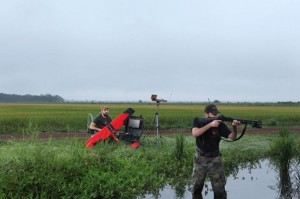 Portions of a sweeping drone-regulation bill in North Carolina became law in October and a major part of the new regulations is making hunters smile and some civil-liberties advocates frown.
Portions of a sweeping drone-regulation bill in North Carolina became law in October and a major part of the new regulations is making hunters smile and some civil-liberties advocates frown.
N.C. House Bill 1099 passed the N.C. House and Senate in June and one key provision that recently went into effect will bar animal-rights activists such as PETA from using drones to monitor hunters. This is not the first battle between hunters and activists. In April, the Pennsylvania state legislature considered a similar bill, designed to combat PETA’s Air Angel surveillance program.
PETA’s blog claims the drones will only be used to capture footage of illegal activity but doesn’t state how such drone use will conform to state laws.
“PETA aims to see a fleet of Air Angels patrolling the skies this fall, capturing footage of hunters engaging in cruel and/or illegal activities—such as shooting deer from the side of the road, baiting fields for ducks or geese, or using dogs to chase turkeys.”
The North Carolina law will be in full effect no later than May 2015. The bill, which received bipartisan support, prohibits:
- Damage or disrupt any manned aircraft operations via drones;
- Possess or deploy a drone armed with any weapons;
- Photograph or conduct surveillance on any persons with a drone or publish drone-recorded photos without consent (unless the photos are recorded at “newsworthy events or events to which the public is invited”).
The bill also authorizes law enforcement to deploy drones to:
- Conduct surveillance with a warrant;
- Deploy drones to stop potential terrorist attacks
- Curtail “imminent danger to life or serious damage to property;”
- Stop the escape of a suspect;
- Search for a missing person;
- Record public gatherings on public or private property.
In addition, drone operators would have to be 18, pass a knowledge and skills test (still to be developed) and require a license for commercial use. Once the FAA permits commercial use, it still wouldn’t be allowed in North Carolina until the Department of Transportation implements testing and licensing. “Here we are, 111 years later, and we’re standing today on the precipice of the next era of aviation,” bill sponsor Rep. John Torbett told fellow House members. “‘First in Flight’ – why not be the first in unmanned flight as well?”
Mike Meno, spokesman for the N.C. ACLU, expressed concern for privacy rights to the Daily Tar Heel, saying:
“(The law allows) surveillance of any public or private event or place where the general public has been invited, which begs the question that if I have my neighborhood over for a barbecue, does that mean that law enforcement have the right to conduct surveillance on my barbecue?”
The National Conference of State Legislatures reports that in 2013, 43 states introduced 130 bills addressing drone issues.
Jason is a longstanding contributor to DroneLife with an avid interest in all things tech. He focuses on anti-drone technologies and the public safety sector; police, fire, and search and rescue.
Beginning his career as a journalist in 1996, Jason has since written and edited thousands of engaging news articles, blog posts, press releases and online content.
Email Jason
TWITTER:@JasonPReagan
Subscribe to DroneLife here.







Leave a Reply